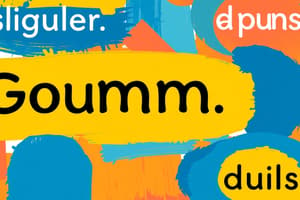Podcast
Questions and Answers
Identify the singular noun in the following sentence: 'The children played with their toys in the park.'
Identify the singular noun in the following sentence: 'The children played with their toys in the park.'
- played
- toys
- park (correct)
- children
Which of these is an example of an irregular plural noun?
Which of these is an example of an irregular plural noun?
- books
- apples
- chairs
- mice (correct)
Which of these words does NOT follow the rule of adding 's' to make it plural?
Which of these words does NOT follow the rule of adding 's' to make it plural?
- woman (correct)
- flower
- table
- tree
Which pair of words illustrates the change from singular to plural noun with a consonant change?
Which pair of words illustrates the change from singular to plural noun with a consonant change?
Which of the following options does NOT represent a plural noun form?
Which of the following options does NOT represent a plural noun form?
Flashcards
Nouns
Nouns
Words that represent people, places, or things.
Singular Nouns
Singular Nouns
Nouns that represent one item and do not end in 's'.
Plural Nouns
Plural Nouns
Nouns that represent two or more items; formed by adding 's'.
Irregular Nouns
Irregular Nouns
Signup and view all the flashcards
Examples of Irregular Nouns
Examples of Irregular Nouns
Signup and view all the flashcards
Study Notes
Nouns
- Nouns represent people, places, or things.
- Examples of people: teacher, children
- Examples of places: beach, cities
- Examples of things: guitar, flowers
Singular Nouns
- Singular nouns represent one item.
- They typically do not have an "s" at the end.
- Example: a bird, a guitar, a computer
Plural Nouns
- Plural nouns represent two or more items.
- To form the plural of a regular noun, add an "s" to the end.
- Example: birds, guitars, computers
Irregular Nouns
- Irregular nouns do not follow the rule of adding "s" to form the plural.
- They have different plural forms.
- Some nouns have a vowel change: foot becomes feet, tooth becomes teeth, man becomes men, woman becomes women.
- Some nouns have a consonant change: leaf becomes leaves, knife becomes knives.
- Some nouns have different plural endings than "s": child becomes children, ox becomes oxen.
- Some nouns become a new word: person becomes people, mouse becomes mice.
- Some nouns don't change form: deer remains deer, fish remains fish.
Studying That Suits You
Use AI to generate personalized quizzes and flashcards to suit your learning preferences.




